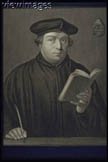
I began this week by looking at Martin Luther King, Jr. I close it by looking at the original Martin Luther.
What is impressive to me about Martin Luther, flawed saint and hero of the Protestant Reformation, is the utter fear he had of a holy God. Prior to his conversion, he wrote, he nearly killed himself with vigils, prayers, and self-abuse, all in an effort to atone for his sins. He was not content, as his superiors insisted, to "relax" about his relationship to God. How could he relax before a holy, just, all seeing God?
It was only when Luther discovered the gospel, that our sins could be forgiven through Jesus' sacrifice (not ours!), that he found rest. It was this discovery that led to the Reformation. It also explains why Luther had such boldness in the face of his enemies -- he feared God so much, he had flushed the fear of others out of his system. His confidence revealed that he knew God's opinion was really all that mattered.
Certainly Luther had his flaws. But we live in a different age, with its own flaws, and can certainly learn from some of his strengths.
Most urgently: Where do we find rest? Are we "relaxed" before God because we figure he's a nice Grandpa in the sky -- or because we have found sure footing for our forgiveness in Jesus Christ?
"In the year that King Uzziah died I saw the Lord sitting upon a throne, high and lifted up; and the train of his robe filled the temple. Above him stood the seraphim. Each had six wings: with two he covered his face, and with two he covered his feet, and with two he flew. And one called to another and said: "Holy, holy, holy is the LORD of hosts; the whole earth is full of his glory!" ... And I said: "Woe is me! For I am lost; for I am a man of unclean lips, and I dwell in the midst of a people of unclean lips; for my eyes have seen the King, the LORD of hosts!" (From Isaiah 6)
Come to me, all who labor and are heavy laden, and I will give you rest. Take my yoke upon you, and learn from me, for I am gentle and lowly in heart, and you will find rest for your souls. (Jesus, from Matthew 11)


4 comments:
I loved this one Kenny! I have received so much encouragement when I research the lives of the great saints of the church. St. Francis is specific one as he struggled so much from depression and yet look how God used him. And of course there is always dearest Peter in the New Testament. We forgot that they are/were just plain folk like us who loved Jesus and tried to live their lives to please their Lord and often did the Romans 7 stuff....I do what I don't want to and don't do what I want or know I should. We need Jesus so very badly...we are nothing without Him. It is all about Him.
Keep up the good stuff. It has been wonderful reading your messages. I've missed your teaching.
Keep your heart and mind on Him.
Love In Christ,
Jeri
I've been reminded of the importance of biography through teaching church history. Tonight I've been reading about John Calvin, who is generally regarded either as a heartless scoundrel or a heartless scholar. But what turns up in his life disproves both, he was a very important figure and also had an inspiring life. And though his teachings were advanced with a lawyer's mind, he had a deep seated passion for the glory of God...and suffered exile and frustration as a result. But he kept going... And isn't that the basic message we always need to hear from Christian biography?
Thy kingdom come
Dear Father, we pray, give us first Thy Word, that the Gospel be preached properly throughout the world; and secondly, that it be received in faith, and work and live in us, so that through the Word and the power of the Holy Ghost Thy kingdom may prevail among us, and the kingdom of the devil be put down, that he may have no right or power over us, until at last it shall be utterly destroyed, and sin, death, and hell shall be exterminated, that we may live forever in perfect righteousness and blessedness.
There are three fundamental principles of the Reformation: the supremacy of the Scriptures over tradition, the supremacy of faith over works, and the supremacy of the Christian people over an exclusive priesthood. The first may be called the objective, the second the subjective, the third the social or ecclesiastical principle.
They resolve themselves into the one principle of evangelical freedom, or freedom in Christ. The ultimate aim of evangelical Protestantism is to bring every man into living union with Christ as the only and all-sufficient Lord and Saviour from sin and death
Post a Comment